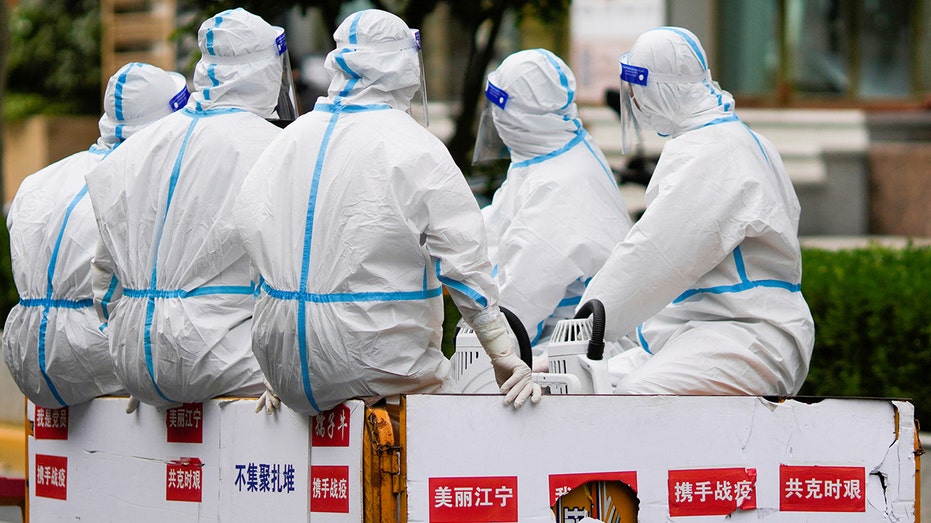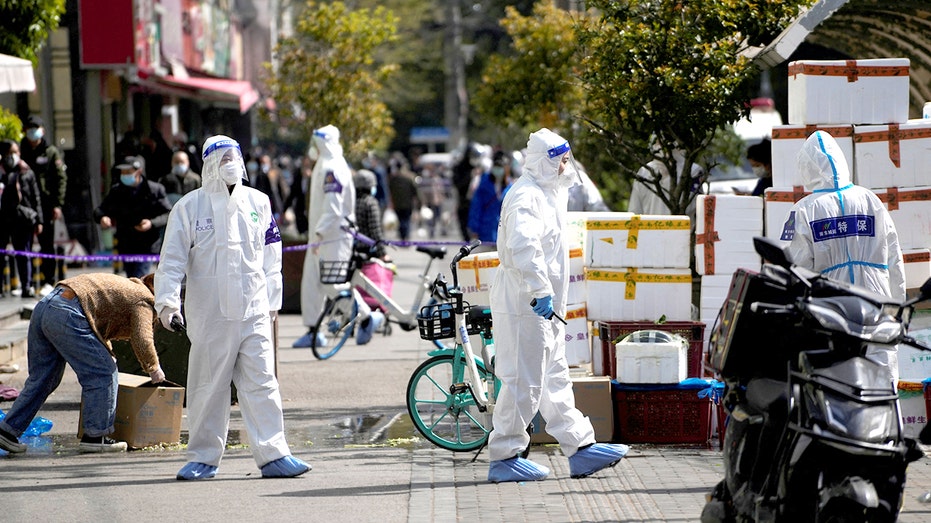China’s hardline COVID lockdowns taking bite out of economy, hurting demand
China is sticking to a zero-COVID policy
Shanghai lockdown supply chain issues ‘real nightmare’: Gordon Chang
Gatestone Institute senior fellow Gordon Chang reacts to the Shanghai lockdown creating a supply chain nightmare.
From electric vehicles to fast food, industries across China are feeling the impact of COVID-19 lockdowns as demand plummets.
Before the lockdowns, EV sales in China, the world’s second-largest economy, were booming. Tesla sales in China jumped more than half in the first quarter while sales from its rival, BYD, quintupled, according to Reuters.

In this photo released by Xinhua News Agency, a villager carrying baggage returns home after being quarantined due to local COVID cases found in Lianqin Village of Beicai Town in Pudong New Area, Shanghai on Tuesday, April 26, 2022. (Jin Liwang/Xinhua via AP / AP Newsroom)
China is sticking to a strict "zero-COVID" policy even as many other countries are easing restrictions and seeing if they can live with the virus. Much of Shanghai — a finance, manufacturing, and shipping hub — remains locked down, disrupting people's lives and dealing a blow to the economy.
BERKSHIRE VICE CHAIRMAN MUNGER: ‘NO QUESTION’ THAT CHINA HAS WORRIED INVESTORS IN THE US
Millions remain restricted to their buildings or compounds in Shanghai under a lockdown that has only slightly eased. Showrooms, stores, and malls in Shanghai, China's largest city, are shut and the city’s 25 million residents are only shopping for basic necessities.
A dealer of a premium German car brand in Jiangsu province, told Reuters that the current lockdowns "could be worst than the first wave of COVID in 2020, when the economy recovery was quick and strong."
"Nowadays, there are more uncertainties in the economy, and the stock and property markets are not doing well," he said.

Workers in protective suits ride an electric tricycle on a street during lockdown, amid the coronavirus disease (COVID-19) pandemic, in Shanghai, China, May 1, 2022. (REUTERS/Aly Song / Reuters Photos)
Credit Suisse analysts said they believe the COVID control measures are putting consumption on a downward spiral, writing in an April 19 research note: "We the consumer sector as being at major risk of the prolonged pandemic and further tightening continue across China."
City officials across China are trying to mitigate these problems by artificially propping up demand, giving residents millions of dollars’ worth of shopping vouches to encourage spending.
CHINA GIVING ‘LIP SERVICE’ TO RUSSIA OVER UKRAINE INVASION, FORMER SEN. LIEBERMAN WARNS
Guangdong on Friday, for instance, began handing subsidies of up to 8,000 yuan ($1,200) to encourage sales of "new energy vehicles" like Volkswagen and BYD.
Many Chinese marked a quiet May Day this year as the government's "zero-COVID" approach restricts travel and enforces lockdowns. Only a trickle of visitors strolled the pedestrian-only streets on Sunday in Beijing's historic Qianmen district, which normally would be bustling with tourists on what was a national holiday and a sunny spring day.

Police and security members in protective suits stand outside cordoned off food stores following the coronavirus disease (COVID-19) outbreak in Shanghai, China March 29, 2022. (REUTERS/Aly Song / Reuters Photos)
Under an order announced the previous afternoon, all Beijing restaurants were closed to dine-in customers Sunday and can offer only takeout and delivery through the end of the national holiday on Wednesday.
The major outbreak in Shanghai, where the death toll has topped 400, appears to be easing. The city recorded about 7,200 new locally transmitted cases on Saturday, down from a peak of 27,605 on April 13. Outside of Shanghai, only 364 new cases were found in the rest of mainland China.
CLICK HERE TO GET THE FOX BUSINESS APP
Beijing, which has tallied 350 cases in the past nine days, is restricting activity to try to prevent a large outbreak and avoid a citywide lockdown similar to Shanghai. Individual buildings and housing complexes with coronavirus cases have been sealed off. Gyms and theaters have been closed for the holiday period. Visitors to many office buildings and tourist sites such as the Great Wall must show proof of a negative COVID-19 test within the previous 48 hours.
The Associated Press contributed to this report.





















